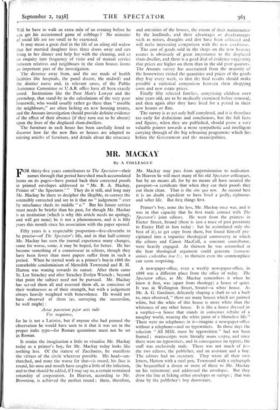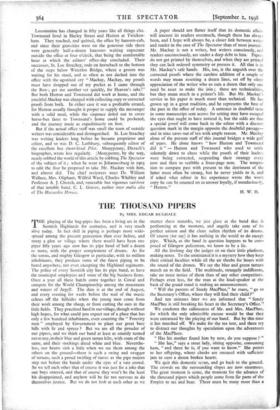MR. MACKAY
By A COLLEAGUE
FOR thirty-five years contributors to The Spectator—their names through that period have shed much accumulated lustre on its pages—have posted back their corrected proofs in printed envelopes addressed to " Mr. R. A. Mackay, Printer of ' the Spectator.' " They do it still, and long may Mr. Mackay be there to decipher the illegible, re-correct the ostensibly corrected and see to it that no " judgement " ever by mischance sheds its middle " e." But his future service must needs be briefer than his past, for though Mr. Mackay is an institution (which is why this article needs no apology, and will get none) he is not a phenomenon, and it is fifty years this month since his association with the paper opened.
Fifty years is a respectable proportion—five-elevenths to be precise—of The Spectator's life, and in that half-century Mr. Mackay has seen the journal experience many changes, some for worse, some, it may be hoped, for better. He has become something of a connoisseur in editors, though they have been fewer than most papers suffer from in such a period. When he started work as a printer's boy in 1888 the remarkable condominium of Meredith Townsend and R. H. Hutton was waning towards its sunset. After them came St. Loe Strachey and after Strachey Evelyn Wrench ; beyond that point the subject need not be pursued. Mr. Mackay has served them all and assessed them all, as conscious of their weaknesses as of their strength, but with a judgement always heavily weighted with benevolence. He would not have observed of them (as, surveying the succession, he well might) : Aetas parentum pejor avis tulit Vos nequiores, for he is not a Latinist, but if anyone else had penned the observation he would have seen to it that it was set in the proper italic type—for Roman quotations must not be set in Roman.
It strains the imagination a little to visualise Mr. Mackay today as a printer's boy, for Mr. Mackay today looks like nothing less. Of the stature of Zacchaeus, he manifests the virtues of the circle wherever possible. His head—un- thatched, and none the worse for that—is round, his face is round, his nose and mouth have caught a little of the infection, and to that should be added, if I may say so, a certain restrained rotundity of corporation. In Heaven, according to Mr. Browning, is achieved the perfect round ; there, therefore, Mr. Mackay may pass from approximation to realisation. In Heaven he will meet many of his old Spectator colleagues, but by no means all, for by no means all have secured the passport—a certificate that when they cut their proofs they cut them clean. That is the sine qua non. As second best it is no doubt expedient to have lived a godly, righteous and sober life. But first things first.
Printer's boy, none the less, Mr. Mackay once was, and it was in that capacity that he first made contact with The Spectator's joint editors. He went from the printers in Exeter Street, Strand (there is just a trace of past proximity to Exeter Hall in him today : but he assimilated only the best of it), to get copy from them, but found himself pre- cipitated into a tripartite theological controversy in which the editors and Canon MacColl, a constant contributor, were heavily engaged. At thirteen he was astonished at the heat theological argument could generate (tantaene animis coelestibus irae ?); to thirteen even the commonplace can seem surprising.
A newspaper-office, even a weekly newspaper-office, in 1888 was a different place from the office of today. The Spectator office, as Mr. Mackay remembers it when he knew it first, was (apart from theology) a house of quiet. It was in Wellington Street, Strand—a white house. As Mr. A. G. Gardiner, delicately shaping a shaft to set a barb to, once observed, " there are many houses which are painted white, but the white of this house is more White than the whiteness of any other house. It is like a house dressed in a surplice—a house that stands in conscious rebuke of a naughty world, wearing the white paint of a blameless life." There were no telephones in it—imagine a newspaper-office without a telephone—and no typewriters. In those days the solecism " All MSS. must be typewritten " had not been framed ; manuscripts were literally manu scripta, and since there were no typewriters, and in consequence no typists, the staff was exclusively male. There was not much of it— the two editors, the publisher, and an assistant and a boy. The editors had no secretary. They wrote all their own letters, Hutton with a steel pen, Townsend with a stylograph (he bequeathed a dozen or more of these to Mr. Mackay on his retirement) and addressed the envelopes. But they drew the line at licking either envelopes or stamps ; that was done by the publisher's boy downstairs. Locomotion has changed in fifty years like all things else. Townsend lived in Harley Street and Hutton at Twicken- ham. They reached, and quitted, the office by hansom-cab, and since their gratuities were on the generous side there were generally half-a-dozen hansoms waiting expectant outside the office at four o'clock, that being the comfortable hour at which the editors' office-day concluded. Their successor, St. Loe Strachey, rode on horseback to the bottom of the steps below Waterloo Bridge, where a groom was waiting for his steed, and as often as not dashed into the office with the agonised cry " Mackay, Mackay, my proofs must have dropped out of my pocket as I came through the Row ; get me another set quickly, for Heaven's sake !" But both Hutton and Townsend did work at home, and the youthful Mackay was charged with collecting copy or corrected proofs from both. In either case it was a profitable errand, for Hutton usually thought it proper to supply the messenger with a solid meal, while the sixpence doled out to cover horse-bus fares to Townsend's home could be pocketed, and the journey made as expeditiously on foot.
But if the actual office staff was small the team of outside writers was considerable and distinguished. St. Loe Strachey was writing leaders long before he became proprietor and editor, and so was D. C. Lathbury, subsequently editor of the excellent but short-lived Pilot. Monypenny, Disraeli's, biographer, wrote less regularly. (Monypenny, by the way,' nearly robbed the world of this article by robbing The Spectator of the subject of it ; when he went to Johannesburg in t9o3 to edit the Star he proposed to take Mr. Mackay with him, and almost did. The chief reviewers were Dr. William Wallace, Mrs. Oliphant, Wilfrid Ward, Charles Whibley and Professor A. J. Church, and, venerable but vigorous survivor of that notable band, C. L. Graves, author inter multa alia of The Hazoarden Horace. A paper should not flatter itself that its domestic affairs will interest its readers overmuch, though there has always been, and I hope will always be, a closer link between writer and reader in the case of The Spectator than of most journals. Mr. Mackay is not a writer, but writers consciously, and readers unconsciously, are under a deep debt to him. Papers do not get printed by themselves, and when they are printed they can lack ordered symmetry or possess it. All that is in Mr. Mackay's safe hands. His, too, is the anguish over the corrected proofs where the careless addition of a couple of words may mean resetting a dozen lines, set off by silent appreciation of the writer who so cuts a dozen that only one need be reset to make the join ; these are technicalities, but they mean much in a printer's life. But Mr. Mackay's service to his paper is much more than technical. He has grown up in a great tradition, and he represents the best of the past in the office of today. A sentence in doubtful taste in some manuscript sent across for setting may have escaped the eyes that ought to have noticed it, but the odds are that a special proof will come back to the editor with a discreet question mark in the margin opposite the doubtful passage— and in nine cases out of ten with ample reason. Mr. Mackay alone of the present staff of this journal bridges a wide gulf of years. He alone knows " how Hutton and Townsend did it " — Hutton and Townsend who used to settle solemnly down to chess while the proofs of their leaders were being corrected, suspending their strategy every now and then to scribble a front-page note. The tempta- tion to compare past with present to the detriment of the latter must often be strong, but he never yields to it, and if asked what editor in his experience wrote the worst copy he can be counted on to answer loyally, if mendaciously, " Hutton."
H. W. H.







































 Previous page
Previous page